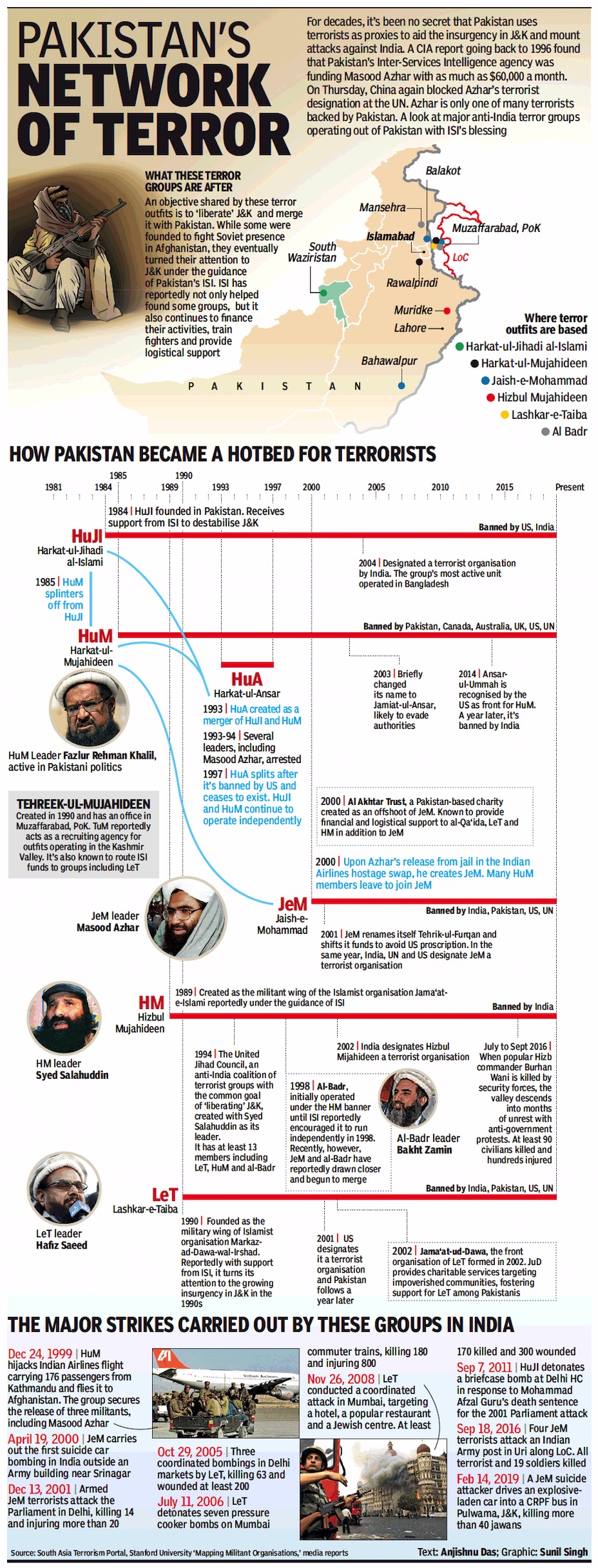Terrorism, sponsored by Pakistan

This is a collection of articles archived for the excellence of their content. |
Contents |
Pakistan’s network of terror
1984-2019

From: March 15, 2019: The Times of India
See graphic:
Pakistan’s network of terror: 1984-2019
Financial Action Task Force
2018/ in "grey list"
Islamabad Has Till June To Clean Up Act
China stayed neutral as Pakistan was put back on an international terrorism financing “grey list” three years after it was removed from it. As the plenary meeting of the Financial Action Task Force closed in Paris on Friday, Pakistan’s fortunes plunged: from June, it will be under what is officially known as “direct ICRG reporting” which will place it under greater international scrutiny, make it more difficult to access overseas funding and directly hit its already ailing economy in an election year.
Pakistan has until June to act against terror groups. This is why, sources said, Pakistan was not mentioned in the final statement on Friday but will be put on the list at the next plenary, slated for June.
The decision was a win for the US, UK, France and Germany, which had cosponsored the move in January, complaining that Pakistan’s promises remained on paper, while terror groups continued to flourish.
China struck deal with US, India; hung Pak out to dry
The United States under Donald Trump has taken a tougher line against Pakistan, which apparently found resonance at the FATF meetings, particularly because there was no Indian presence.
India, however, has reason to be particularly pleased because it has embarked on a huge diplomatic exercise to shame Pakistan on its support to terrorism. Pakistan’s presence back in the grey list will continue to focus international attention on its terror activities. Pakistan was on the watch list between 2012- 2015 for money-laundering.
According to news reports, Pakistan has three months to convince the body that it has acted against terror organisations. But it will be difficult, particularly as elections loom in the country and given the support that the terror groups enjoy among the military-intelligence complex and the political class.
It was the US which reintroduced the motion after the Pakistan minister breached confidentiality — a strict norm — with the tweet claiming that Pakistan will not be put back on the list. Hectic negotiations were on in Washington for the past couple of days as China, which had supported Pakistan, was persuaded to stand down, as were the Gulf Cooperation Council (GCC) and Turkey. Getting China to roll back its backing for Pakistan was a tough task, given its ties with Islamabad. But China is lobbying for a top position in the FATF and will need support from the sponsor countries. India and the US pledged support to Beijing in return for its neutrality on Pakistan.
Russia was also tilting towards Pakistan but was persuaded by India. Turkey in fact, remained the last country blocking the move against Pakistan.
Earlier this week, Pakistan’s foreign minister Khawaja Asif had tweeted from Moscow that Pakistan had been let off the hook for three months, with a US-led motion at FATF being “defeated”. The resolution was blocked by China, Turkey and the GCC, which was acting on the instructions of Saudi Arabia, Pakistan’s staunch supporter. (Pakistan has just deployed troops for Saudi Arabia’s anti-terror coalition which is widely seen as an anti-Iran body, something it had refused to do earlier).
China’s action is significant because it has invested over $60 billion in the China-Pakistan Economic Corridor and to build Gwadar port. But China, too, has been plagued by Pakistan’s terrorists, losing workers to terror violence.
Last week, reports said China had begun direct talks with Baloch nationalists who have every reason to sabotage CPEC. The FATF listing may not affect China’s investment inside Pakistan, which is a sovereign strategic decision by Beijing and not directed by international trends. But it sends a strong message to Pakistan that it needs to roll up its terror infrastructure if China is to stay invested. In addition, a decision like this by China also indicates a “deal” being struck with one or more of the sponsor countries.
Pakistan made a strong pitch for itself, showing that it had seized assets belonging to LeT, JuD and Falah-Insaniyat Foundation just weeks before the meeting. That apparently did not cut much ice, because the final decision was taken unanimously. Financial agencies said Pakistan may be staring at a risk downgrade by IMF, World Bank and other multilateral lenders, in addition to making it difficult to source funding from international markets. However, it must be remembered that during its previous listing, Pakistan received an IMF bailout, largely with support from US.
2019/ FATF subgroup ‘blacklists’ Pakistan
Indrani Bagchi, August 24, 2019: The Times of India
Pakistan was placed in the “enhanced expedited follow-up list” by the Asia-Pacific Group for its failure to act credibly against terror financing and money laundering. This is tantamount to being blacklisted, and the APG’s conclusion will have an impact on Pakistan’s prospects at the FATF in October.
Pakistan was found to be non-compliant on 32 parameters out of 40. On 11 effectiveness parameters, Pakistan was found to be “low” on 10.
Pakistan had sent a highlevel team under the governor of its central bank, to make its case at the Canberra plenary, but given that its actions on the ground did not match its promises it failed to convince the group. In fact, the discussions on Pakistan carried on for over seven hours across two days, indicating that the APG were giving Pakistan a detailed hearing. Pakistan will find the going tough even in the coming FATF plenary, because the findings of the APG will have an impact.
See also
Terrorism, sponsored by Pakistan